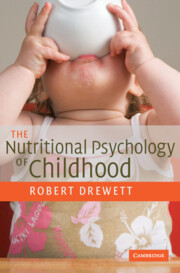Book contents
- Frontmatter
- Contents
- List of illustrations and table
- Preface
- 1 Introduction
- 2 The development of feeding behaviour: infancy
- 3 The development of feeding behaviour: weaning onwards
- 4 Born too small or born too soon
- 5 Nutritional deficiencies
- 6 Nutritional aspects of some physical conditions
- 7 Failure to thrive
- 8 Adiposity and obesity
- 9 Adolescence and the eating disorders
- 10 Some concluding thoughts
- References
- Index
6 - Nutritional aspects of some physical conditions
Published online by Cambridge University Press: 22 September 2009
- Frontmatter
- Contents
- List of illustrations and table
- Preface
- 1 Introduction
- 2 The development of feeding behaviour: infancy
- 3 The development of feeding behaviour: weaning onwards
- 4 Born too small or born too soon
- 5 Nutritional deficiencies
- 6 Nutritional aspects of some physical conditions
- 7 Failure to thrive
- 8 Adiposity and obesity
- 9 Adolescence and the eating disorders
- 10 Some concluding thoughts
- References
- Index
Summary
Phenylketonuria
At the end of Chapter 3 we considered the effects of diarrhoeal diseases on food intake and growth. Diarrhoeal diseases are usually temporary, and can affect any child. In this chapter we will consider nutritional problems associated with some long-term illnesses or disabilities. Almost all long-term illnesses and disabilities have nutritional aspects to them and the examples considered here are just examples. I have chosen these examples because they illustrate important general principles (PKU), because nutritional aspects are central to the disorder (cystic fibrosis), because there can be a tendency to overlook disorders that are found only in minority ethnic groups (sickle cell disease) or because they relate to other problems dealt with in other chapters (cerebral palsy). But mainly I have chosen them because interesting and important research is available on them.
Phenylketonuria (PKU) has been described as a classic example of a genetic disorder (Scriver & Clow, 1980a; 1980b). It is inherited as an autosomal recessive trait. As a recessive trait, PKU develops in the child only if they have two copies of a gene for the condition. If both parents are heterozygotes (i.e. if they each have a single copy of the gene) one in four of their children, on average, will have two copies and so will develop the disorder. Children with a single copy are carriers, and they are only slightly different from children without any PKU genes.
- Type
- Chapter
- Information
- The Nutritional Psychology of Childhood , pp. 110 - 122Publisher: Cambridge University PressPrint publication year: 2007



